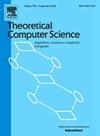Towards transitive-free digraphs
IF 0.9
4区 计算机科学
Q3 COMPUTER SCIENCE, THEORY & METHODS
引用次数: 0
Abstract
In a digraph D, an arc in D is considered transitive if there is a path from x to y in . A digraph is transitive-free if it does not contain any transitive arc. In the Transitive-free Vertex Deletion (TVD) problem, the goal is to find at most k vertices S such that has no transitive arcs. In our work, we study a more general version of the TVD problem, denoted by ℓ-Relaxed Transitive-free Vertex Deletion (ℓ-RTVD), where we look for at most k vertices S such that has no more than ℓ transitive arcs. We explore ℓ-RTVD on various well-known graph classes of digraphs such as directed acyclic graphs (DAGs), planar DAGs, α-bounded digraphs, tournaments, and their multiple generalizations such as in-tournaments, out-tournaments, local tournaments, acyclic local tournaments, and obtain the following results. Although the problem admits polynomial-time algorithms in tournaments, α-bounded digraphs, and acyclic local tournaments for fixed values of ℓ, it remains -Hard even in planar DAGs with maximum degree 6. In the parameterized realm, for ℓ-RTVD on in-tournaments and out-tournaments, we obtain polynomial kernels parameterized by for bounded independence number. But the problem remains fixed-parameter intractable on DAGs when parameterized by k.
趋向于无传递有向图
在有向图D中,如果D - e中存在从x到y的路径,则认为D中的弧e=(x,y)是可传递的。有向图是无传递的,如果它不包含任何传递弧。在无传递顶点删除(TVD)问题中,目标是找到最多k个顶点S,使得D−S没有传递弧。在我们的工作中,我们研究了TVD问题的一个更一般的版本,用l -松弛的无传递顶点删除(l -RTVD)来表示,其中我们寻找最多k个顶点S,使得D - S的传递弧不超过l。研究了有向无环图(dag)、平面dag、α-有界有向图(α-有界有向图)、比赛以及它们的多重推广(in-tournament、outtournament、local tournament、acyclic local tournament)上的r -RTVD,得到了以下结果。尽管该问题在竞赛、α-有界图和固定值的无环局部竞赛中允许多项式时间算法,但即使在最大度为6的平面dag中,它仍然是NP-Hard。在参数化领域,对于比赛中和比赛外的r -RTVD,我们得到了有界独立数用k+ r参数化的多项式核。但是当参数化为k时,问题仍然是固定参数难以解决的。
本文章由计算机程序翻译,如有差异,请以英文原文为准。
求助全文
约1分钟内获得全文
求助全文
来源期刊

Theoretical Computer Science
工程技术-计算机:理论方法
CiteScore
2.60
自引率
18.20%
发文量
471
审稿时长
12.6 months
期刊介绍:
Theoretical Computer Science is mathematical and abstract in spirit, but it derives its motivation from practical and everyday computation. Its aim is to understand the nature of computation and, as a consequence of this understanding, provide more efficient methodologies. All papers introducing or studying mathematical, logic and formal concepts and methods are welcome, provided that their motivation is clearly drawn from the field of computing.
 求助内容:
求助内容: 应助结果提醒方式:
应助结果提醒方式:


